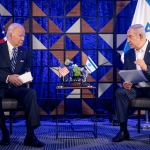Reading Jonathan Edwards
Nathan Finn is provost and dean of the university faculty at North Greenville University. He also serves there as professor of Christian studies and history. Nathan has teamed up Jeremy Kimble to edit A Reader’s Guide to the Major Writings of Jonathan Edwards. https://www.amazon.com/Readers-Guide-Writings-Jonathan-Edwards/dp/143355481X
David George Moore conducted the following interview. Various videos of Dave’s can be found at www.mooreengaging.com.
Moore: Books on Edwards continue to churn out at a brisk pace. Why did you think this one was a necessary addition to the already massive amount of books on Edwards?
Finn: Of the writing of books about Jonathan Edwards there is no end! But there really isn’t another book exactly like this one: an introduction to Edwards’ major writings, written by evangelical scholars, for a primarily evangelical audience. With the completion of the Yale Edition of the Works of Jonathan Edwards a decade ago, plus the wide availability of inexpensive, non-critical reprints, nearly everyone has access to these writings. We hope our book functions as an entry point into that world.
Moore: Edwards thought with his pen. He constantly sought to capture his ideas on paper, something that was not easy to procure. I often thought how fun it would be to take Jonathan to Office Depot or Staples! I was motivated to keep journals and teaching notebooks early on. For those who aren’t teachers, would you recommend that all Christians seek to capture their thoughts on paper?
Finn: Absolutely. While I’ve never been one for journaling, I’ve always been one for jotting. Whether through blogging, email or text exchanges with friends, handwritten notes in a journal, or typed notes in Evernote, I’m always jotting down ideas about topics that interest me such as theology, leadership, and Christian higher education. I think it’s a good discipline. Plus, even if our jotted thoughts never go public, some of them might be worth passing on to our children or grandchildren one day.
Moore: Daniel Fuller encouraged his students to choose one theologian for a lifetime of study. One of Fuller’s students, John Piper, chose Edwards. Do you agree with Fuller’s counsel? If so, name some other worthies you would recommend ministers to spend a lifetime reading?
Finn: Interestingly, I stole this idea from Fuller (via Piper’s recollections) and make the same recommendation to my own students. For me, Edwards has been that individual, largely because of Piper’s influence in the formative years of my Christian walk. Others include C.S. Lewis (who was more of a theologian than he claimed to be), Abraham Kuyper, Herman Bavinck, and Andrew Fuller. The latter isn’t as well known, but like me he was a Baptist theologian who was profoundly shaped by the writings of Edwards. I’d recommend all of these worthies. But there are many other worthy choices as well. The key is to pick one or two and stick with them.
Moore: Would you briefly describe a few of the biggest misconceptions about Jonathan Edwards?
Finn: One common misconception is that he was a “hellfire-and-brimstone” preacher. Many people assume this because of his most famous sermon, “Sinners in the Hands of an Angry God.” But that sermon is one of only a few that could be characterized in this manner. He was really more of a doctrinal preacher. Another misconception is that he was a cold, rationalistic Calvinist. Now he was a staunch Calvinist, to be sure, and I don’t track with all of his convictions in that regard. But Edwards was no cold rationalist—he wrote for the heart, and it’s his writings about spirituality such as Religious Affections, Charity and Its Fruits, and his revival works that have most captured my own spiritual imagination.
Moore: Jonathan Edwards made a list of resolutions. Later in life he became more sensitized to the pride of making such a list. Even with the ever-present temptation of pride, do you find value in making such a list? Have you ever made a list of resolutions like the one Edwards put together?
Finn: I think there is value in making such a list, provided that it is a reference point for the pursuit of holiness and spiritual maturity rather than a legalistic checklist. I have never made a list of resolutions per se. I do periodically write out short-term and long-term goals for myself, and some of them are related to my walk with Christ. To give one example, I have a goal to try and share the gospel with an unbeliever at least once a month. Some months I do so, and others I fall short. I also have an accountability partner with whom I check in at the end of each month to talk about this goal. I think that sort of discipline is healthy.
Moore: Please describe the common idea of preparationism and how Edwards broke from that Puritan understanding of salvation.
Finn: Most Colonial Puritans believed that God prepared the elect for regeneration through their participation in various means of grace such as public worship, prayer, and fasting. They believed that the normal course of one’s spiritual life was to be raised in a Christian family, participate in these means of grace, and at some point to come into awareness of their regeneration, which would result in “owning the covenant” (professing Christ publicly) for themselves. They also believed it was presumptuous to express assurance of one’s salvation. Edwards pushed back on this formula. Far more than his Puritan predecessors, he emphasized the experience of conversion, which was evidence of one’s regeneration and, consequently, one’s election. He thought it was normal to have a basic assurance of one’s salvation, even while admitting that God alone knows the heart of each individual. He was never a radical who believed that a conversion experience of some sort automatically meant someone was an authentic Christian, but he did believe that a lack of emphasis on personal conversion contributed to nominal faith. I believe his critically positive approach to conversion, which avoided both the “conversionism” of the radicals and “gradualism” of the preparationists, remains helpful. Conversionism too often leads to false professions, while gradualism too often leads to a sentimental or superficial identification with the faith.
Moore: What are a few things you hope your readers will take from your book?
Finn: I hope that readers take away three things. First, Edwards is a prolific writer who offers something for everyone: theologians, philosophers, preachers, and lay Christians who enjoy reading spiritually edifying writings. Second, Edwards is worth reading because of the quality of his life and the significance of his writings. Third, go read Edwards! I recommend beginning with Charity and It’s Fruits, which is his published expositions of 1 Corinthians 13.















